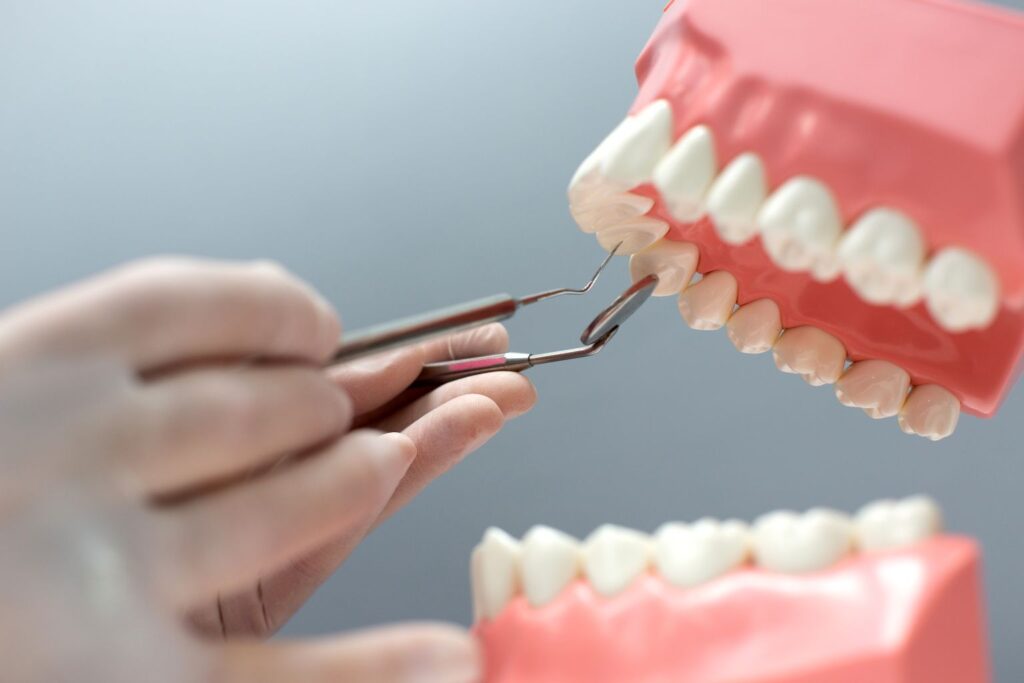No, a dental bridge is not normally painful. The procedure is done under local anesthesia, which will numb the area to be treated. Most individuals experience no discomfort or slight pain during the procedure. You may experience some mild soreness or sensitivity afterwards, but it will pass in a few days. A qualified Castle Downs dentist can ensure your treatment is painless and straightforward.
In this blog, we will go through what to expect during a dental bridge procedure, how long it takes to recover, and what to expect prior to and following the procedure.
What is a Dental Bridge?
A dental bridge is a fixed dental prosthetic appliance to restore one or several missing teeth. It is anchored by the adjacent teeth on either side of the space; the bridge has two or more crowns for the abutment teeth and a false tooth or teeth in the middle.
Dental bridges are constructed from a variety of different materials: porcelain, metal, or both. Each bridge is specifically designed for your mouth and to blend with your natural teeth.
What Happens During the Dental Bridge Procedure?
When you go in for dental bridges in Edmonton, the process usually takes two or more visits.
First Visit:
- The dentist will examine your mouth and prepare the teeth that will support your bridge (abutment teeth).
- The dentist will remove a small amount of enamel from the teeth; this will allow space for the crowns.
- The dentist will take a record of your teeth, which will be sent to the dental lab for fabrication of your bridge.
- A temporary bridge will be placed to protect your teeth until your final bridge is made.
Second Visit:
- Your temporary bridge is taken out.
- The dentist puts in and adjusts your permanent bridge.
- After it’s fitted right, the bridge is cemented
The process is usually painless since the dentist will numb the area with local anesthesia before starting any work.
Is the Dental Bridge Procedure Painful?
The procedure itself is not painful because the area is numbed during tooth preparation. You may feel some pressure or vibrations from the dental tools, but there should be no sharp pain.
After the numbness wears off, some sensitivity or mild discomfort is common. This is especially true if the teeth supporting the bridge were filed down. Most people find that the discomfort is manageable and goes away within a few days.
How Will I Feel After a Dental Bridge?
You might ask, “How will I feel after a dental bridge?“ The answer depends on your personal sensitivity and how your body adjusts to the new bridge. It is normal to feel the following after the procedure:
- Mild soreness in your gums or teeth
- Sensitivity to hot or cold foods
- Slight discomfort while chewing
- A feeling that the bridge is bulky or unfamiliar
These sensations usually improve as your mouth adjusts. Over-the-counter pain relievers like ibuprofen can help manage any soreness.
How Long Does It Take for a Dental Bridge to Settle Down?
It usually takes a few days to a couple of weeks for your mouth to fully adjust to the new bridge. You might wonder, “How long does it take for a dental bridge to settle down?“ For most patients, the answer is about one to two weeks.
During this time:
- Eat soft foods and avoid very hot or very cold items
- Chew on the opposite side of the bridge if needed
- Brush gently and maintain good oral hygiene
If discomfort lasts longer than two weeks or worsens, you should contact your dentist to make sure everything is healing properly.
Trust Albany Dental for Comfortable Dental Bridge Treatment
At Albany Dental, we understand that getting a dental bridge can feel intimidating. Our team takes extra care to ensure your comfort before, during, and after the procedure. If you are considering dental bridges in Edmonton, we invite you to schedule a consultation with our friendly and experienced team.
